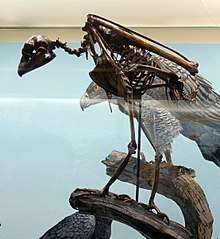Woodward's eagle
| Amplibuteo woodwardi | |
|---|---|
 | |
| Skeleton from the La Brea Tar Pits | |
| Scientific classification | |
| Kingdom: | Animalia |
| Phylum: | Chordata |
| Class: | Aves |
| Order: | Accipitriformes |
| Family: | Accipitridae |
| Genus: | Amplibuteo |
| Species: | †A. woodwardi L. Miller 1911[1] |
Woodward's eagle (Amplibuteo woodwardi) is an extinct species of eagle that lived in North America and the Caribbean during the Late Pleistocene.[1] It is one of the largest birds of prey ever found, with an estimated total length 125.6 to 140.2 cm (49.4 to 55.2 in), and considerably larger than any living eagle. Haast's eagle reached similar lengths but appears to have been both somewhat more robust and shorter-winged than Woodward's, as Haast's was a forest-dwelling species.[1] Woodward's eagle appears to have hunted in open habitats, taking primarily small mammals and reptiles.[1]
References
- 1 2 3 4 Suarez, William (2004). "The Identity of the Fossil Raptor of the Genus Amplibuteo (Aves: Accipitridae) from the Quaternary of Cuba" (PDF). Caribbean Journal of Science. Puerto Rico: College of Arts and Sciences. 40 (1): 120–125.
This article is issued from
Wikipedia.
The text is licensed under Creative Commons - Attribution - Sharealike.
Additional terms may apply for the media files.